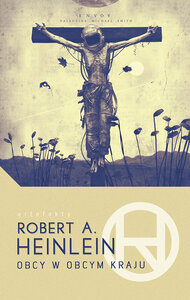You need to sign in or sign up before continuing.
Take a photo of a barcode or cover
Heinlein definitely makes you think about your culture, your way of life, and whether you're living life on autopilot to fit in with common conceptions. However, he fails to see the irony in saying "Everyone is their own master" and heavily implying, "...except women". His female characters are less people and more talking boards for a number of "brilliant" men. But guess what, it's easy to prove anything is the optimal solution, even *libertarianism*, if you surround one verbose and somewhat well-reasoned dude (Jubal Harshaw) with women who offer no opposition other than "Oh goodness! But that's not how things are done!". Heinlein writes the exact circumstances where his particular political and moral philosophies will thrive, and hopes you will make the logical fallacy of extrapolating these ideas as applicable to the entire world.
In sum: it's definitely a book to make you think, and has some cool historical context ( I have a feeling the ideas in this book were much more controversial when it was published). But don't get swept up in the world according to Heinlein - his world is outdated.
In sum: it's definitely a book to make you think, and has some cool historical context ( I have a feeling the ideas in this book were much more controversial when it was published). But don't get swept up in the world according to Heinlein - his world is outdated.
adventurous
challenging
dark
emotional
mysterious
reflective
tense
slow-paced
Plot or Character Driven:
A mix
Strong character development:
Complicated
Loveable characters:
No
Diverse cast of characters:
Yes
Flaws of characters a main focus:
Complicated
Philosophy masquerading as fiction is usually always a difficult pill to swallow. If not for a lot of dated cultural mannerisms which today would be deeply concerning, a lack of foresight, and a cast of pedantic and idiotic characters it could have been a good book. Summed up, this book is just like one big Euthyphro Dilemma from Plato's dialogues adapted for the space age.
adventurous
hopeful
informative
inspiring
mysterious
reflective
medium-paced
Plot or Character Driven:
A mix
Strong character development:
Yes
Loveable characters:
Yes
Diverse cast of characters:
No
Flaws of characters a main focus:
Yes
Name checking me in the first sentence of your book will always result in a higher rating
medium-paced
Plot or Character Driven:
A mix
Strong character development:
Complicated
Loveable characters:
No
Diverse cast of characters:
No
Flaws of characters a main focus:
No
Just finished for a second time and I grok much more this time around :)
adventurous
funny
hopeful
reflective
slow-paced
Plot or Character Driven:
Character
Strong character development:
Yes
Loveable characters:
Yes
Diverse cast of characters:
No
Flaws of characters a main focus:
Yes
Sadly stymied by the chains of its own era of conception, "Stranger in a Strange Land" does not live up to the same level of moral complexity as other of Heinlein's novels. I understand that the treatment of women and race is a product of the novel's temporal conception but I was hoping Heinlein's work would extend the commentary on religion further than what he did. While nearly all the characters are largely forgettable, Jubal stands out as a three-dimensional character with a moral philosophy that keeps the story from becoming too painful to read.
I was drawn in by the promise of a satirical critique of religion but by the time I put it down I felt like I was the one Heinlein was poking fun at.
This is probably one of those books that, if you read as a teenager, might hold some place in your heart as an insightful challenge to the status quo. Right when you're coming to understand your own sexuality, a book preaching sexual openness might seem profound.
Reading for the first time as an adult, the Hugh Hefner brand 'progressiveness' is not nearly enough to maintain credibility as a thought-provoking text or, for that matter, even much interest. Its gender politics are cringe-worthy throughout (at best) and are at times outright offensive. Anti-gay homophobia is also just plain offensive (lesbians are, of course, permissible in the Hugh Hefner world Heinlein has gifted us).
In short, more relevant as a study of its times than an important contribution to science fiction, literature, or much else for that matter.
This is probably one of those books that, if you read as a teenager, might hold some place in your heart as an insightful challenge to the status quo. Right when you're coming to understand your own sexuality, a book preaching sexual openness might seem profound.
Reading for the first time as an adult, the Hugh Hefner brand 'progressiveness' is not nearly enough to maintain credibility as a thought-provoking text or, for that matter, even much interest. Its gender politics are cringe-worthy throughout (at best) and are at times outright offensive. Anti-gay homophobia is also just plain offensive (lesbians are, of course, permissible in the Hugh Hefner world Heinlein has gifted us).
In short, more relevant as a study of its times than an important contribution to science fiction, literature, or much else for that matter.
Oooft. Had some interesting concepts but it was hard to get past the 60s-style sexism. The author could envisage flying cars and telekinesis but not a world where women could have jobs other than as a Vegas showgirl, secretary, or nurse...


